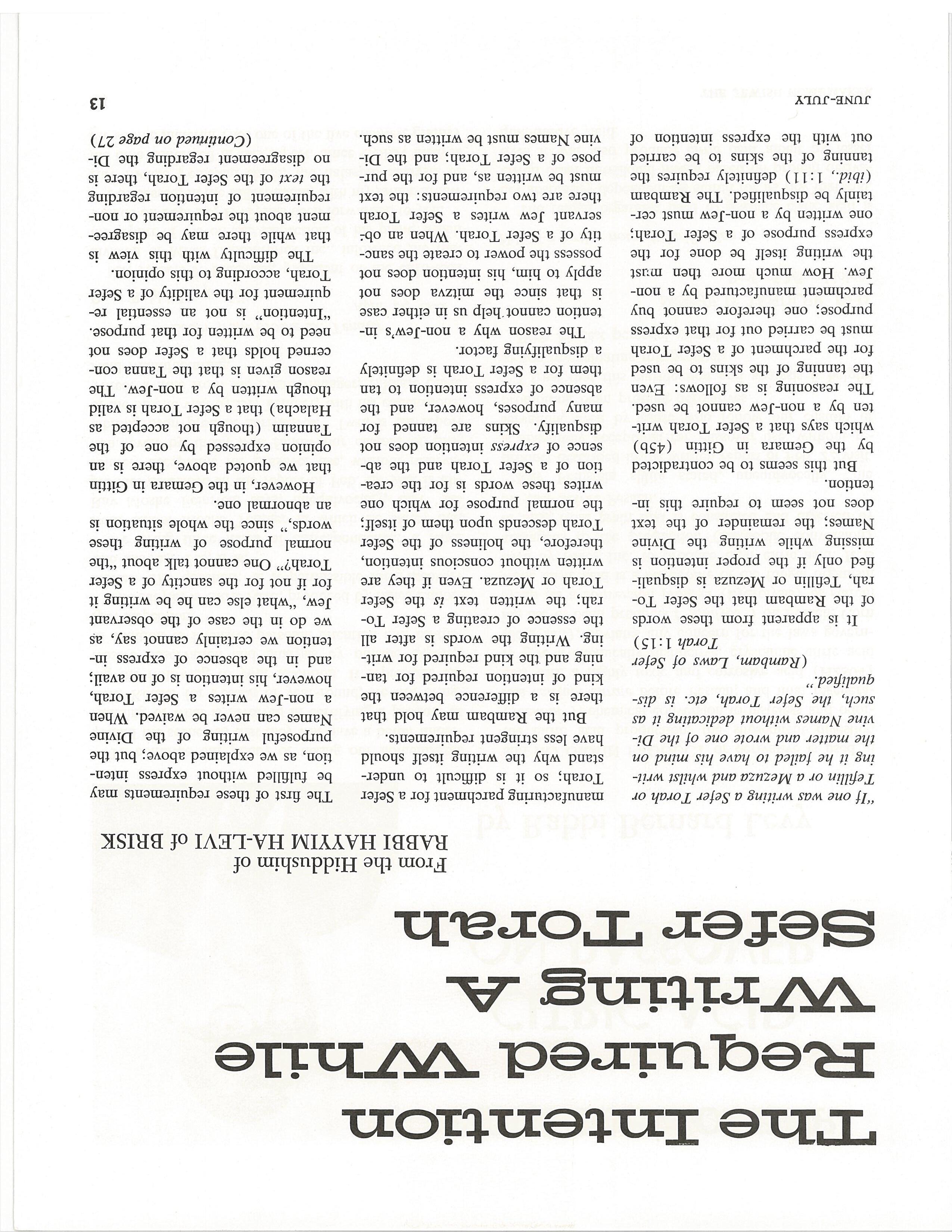
2 minute read
R.eq ired ~NT3aile Writixig A Sefer nI~ora,]a
From the Hiddushim of RABBI HAYYIM HA-LEVI of BRISK
“If one was writing a Sefer Torah or Tefihlin or a Mezuza and whilst writ ing it he failed to have his mind on the matter and wrote one of the Di vine Names without dedicating it as such, the Sefer Torah, etc. is dis qualified.”
Advertisement
(Rambam, Laws of Sefer Torah 1:15)
It is apparent from these words of the Rambam that the Sefer To rah, Tefihlin or Mezuza is disquali fied only if the proper intention is missing while writing the Divine Names; the remainder of the text does not seem to require this in tention.
But this seems to be contradicted by the Gemara in Gittin (45b) which says that a Sefer Torah writ ten by a non-Jew cannot be used. The reasoning is as follows: Even the tanning of the skins to be used for the parchment of a Sefer Torah must be carried out for that express purpose; one therefore cannot buy parchment manufactured by a nonJew. How much more then must the writing itself be done for the express purpose of a Sefer Torah; one written by a non-Jew must cer tainly be disqualified. The Rambam (ibid., 1: 11) definitely requires the tanning of the skins to be carried out with the express intention of manufacturing parchment for a Sefer Torah; so it is difficult to under stand why the writing itself should have less stringent requirements.
But the Rambam may hold that there is a difference between the kind of intention required for tan ning and the kind required for writ ing. Writing the words is after all the essence of creating a Sefer To rah; the written text is the Sefer Torah or Mezuza. Even if they are written without conscious intention, therefore, the holiness of the Sefer Torah descends upon them of itself; the normal purpose for which one writes these words is for the crea tion of a Sefer Torah and the ab sence of express intention does not disqualify. Skins are tanned for many purposes, however, and the absence of express intention to tan them for a Sefer Torah is definitely a disqualifying factor.
The reason why a non-Jew’s in tention cannot help us in either case is that since the mitzva does not apply to him, his intention does not possess the power to create the sanc tity of a Sefer Torah. When an ob: servant Jew writes a Sefer Torah there are two requirements: the text must be written as, and for the pur pose of a Sefer Torah; and the Di vine Names must be written as such.
The first of these requirements may be fulfilled without express inten tion, as we explained above; but the purposeful writing of the Divine Names can never be waived. When a non-Jew writes a Sefer Torah, however, his intention is of no avail; and in the absence of express in tention we certainly cannot say, as we do in the case of the observant Jew, “what else can he be writing it for if not for the sanctity of a Sefer Torah?” One cannot talk about “the normal purpose of writing these words,” since the whole situation is an abnormal one.
However, in the Gemara in Gittin that we quoted above, there is an opinion expressed by one of the Tannaim (though not accepted as Halacha) that a Sefer Torah is valid though written by a non-Jew. The reason given is that the Tanna con cerned holds that a Sefer does not need to be written for that purpose. “Intention” is not an essential re quirement for the validity of a Sefer Torah, according to this opinion.
The difficulty with this view is that while there may be disagree ment about the requirement or nonrequirement of intention regarding the text of the Sefer Torah, there is no disagreement regarding the Di (Contittued on page 27)







